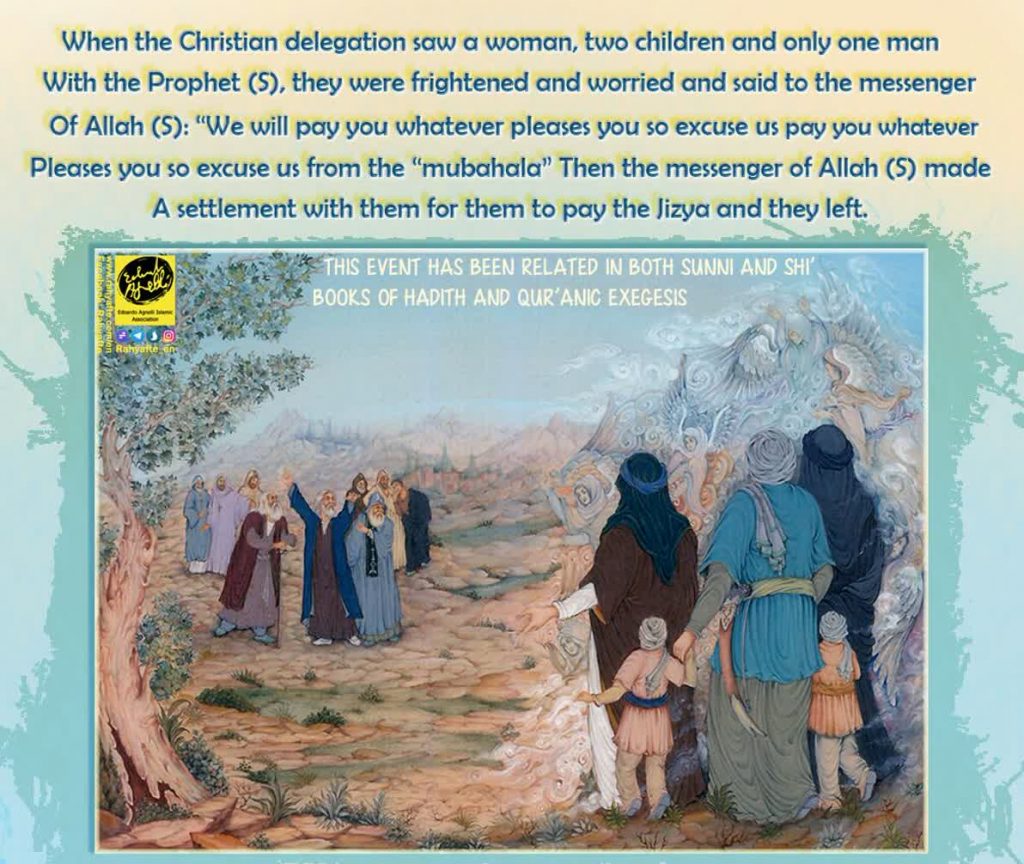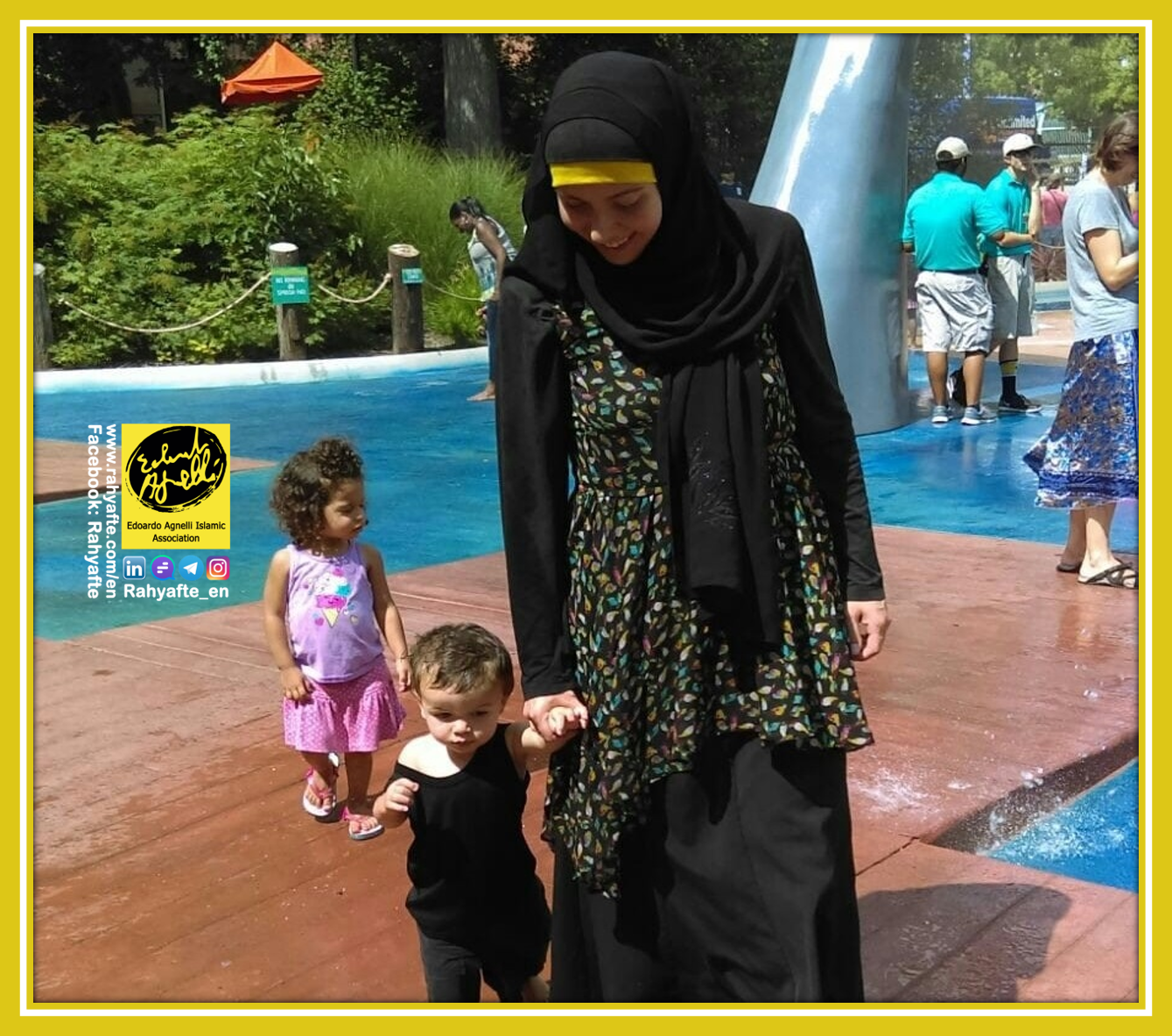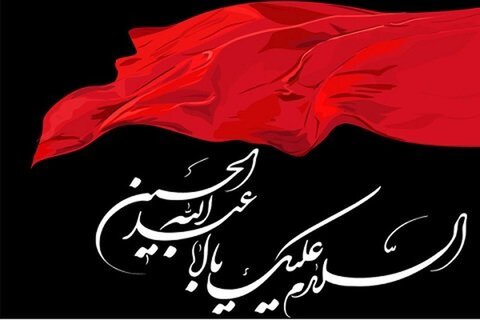According to rahyafte ( the missionaries and converts website):
The Event or Eid al-Mubahalah
In the Name of Allah, the Most Compassionate, the Most Merciful.
O Allah! Send your blessings to the chief of Your Messengers and the Last of Your Prophets, Muhammad (S), and his pure and cleansed progeny.
Should anyone argue with you concerning him, after the knowledge that has come to you, then say: ‘Come! Let us call our sons and your sons, our women and your women, our souls and your souls, then let us pray earnestly and call down Allah’s curse upon the liars’. (Qur’an 3:61)
This verse refers to the famous event of ‘al-Mubahala ‘ which took place in the year 10 A.H between the Prophet (S) and the Christians of Najran and which is mentioned in all well-known books of traditions, tafsir (exegesis) and history by Muslim scholars.
Najran was a fertile land located in the northern mountainous region of Yemen about 20 Km from Sana’a. About 40,000 Christians inhabited the land divided into 73 small towns. They were idol worshipers historically just like the Arabs, but a priest named Phemion (Faymiyun), a builder by profession, preached Christianity in the area of Najran and soon all the population converted to Christianity and Najran became a important center for the Christians. They also constructed a church and named it ‘Ka’ba-e-Najran’. They prayed and offered various offerings there which resulted in an annual income of about two hundred thousand Dinars which was used for the priest who lived and studied there.
After the conquest of Makkah, when Islam started spreading rapidly and the warring groups came under the flag of Islam, the Holy Prophet (S) started sending emissaries to the tribes who had not yet accepted Islam. In 10 A.H. a similar message was sent to the Christians of Najran and they were offered either to accept the teachings of Islam or live in the protection of Muslims and pay the Jizya tax.
The Prophet of Islam (S) had written a letter to Abu al-Harith ibn ‘Alqama, the Grand Bishop of Najran, who was the official representative of the Roman Church in the Hijaz and invited the people of that area to embrace Islam.
Christian mission heads to Madina
After deliberations, the Christians finally decided to send a mission to Madina and have a dialogue with the Muslims. A delegation of Christians headed by al-‘Aqib and Abu al-Harith started off for Makkah. Abu al-Harith was regarded as the greatest Bishop and scholar of the Christian world of the time and al-‘Aqib was the biggest strategist and negotiator of the time. When the delegation reached Madina, the people were impressed by their lavish dressing and pomp and show since it was the first time that a delegation had arrived in such a manner.
When they entered the Masjid al-Nabawi, the Prophet Mohammad (S) looked at the precious stones, gold and silk clothes that they were wearing and turned away his face and did not pay any attention to them. After a while when no one noticed their pomp and show, they left the mosque and met Uthman b. ‘Affan and ‘Abd-ur-Rahman b. ‘Awf outside and asked them as to why they were invited by the Muslims and then treated in this manner.
Uthman suggested that they consult Imam Ali (AS). When the delegation came to Imam Ali (AS) he told them that they were wearing dresses of silk and ornaments of gold which depicted their pride and that they should take them off and dress simply. Only then would the Prophet (S) allow them to visit him and entertain them. When they followed the instructions of Imam Ali (AS), they were allowed to visit the Prophet Mohammad (S) after the prayers of ‘Asr and have discussions with him.
In the al-Tafsir of ‘Ali bin Ibrahim al-Qummi it is narrated from Imam al-Sadiq (AS):
‘The Christians of Najran came (as a delegation) to the Messenger of Allah…. they rang the hand-bells and prayed; the Prophet’s companions objected: “O Messenger of Allah! This in your mosque”? He (S) said: “Leave them (to pray as they like)”.
When they finished, they came to the Prophet (S) and said: “To what do you call”? He (S) said: “To bear witness that there is no God but Allah and that I am the Messenger of Allah and that ‘Isa (Jesus) (a.s) is created a slave (of Allah), and he used to eat, drink and relieve himself”.
They said: “Then who was his father”? The revelation was then revealed to the Messenger of Allah (S) saying: “Say to them – what do you say about Adam, was he a created slave (of Allah), who would eat, drink, relieve himself and cohabit”? So the Prophet (S) asked them and they replied: “Yes”. He (S) asked them: “Then who was his father”? They could not answer, so Allah revealed:
Verily, the similitude of Jesus with Allah is as the similitude of Adam; Allah created him out of dust, then said to him, ‘Be’, and he became (3:59)
till the verse:
And should anyone argue with you concerning him, after the knowledge that has come to you…. and call down Allah’s curse upon the liars. (3:61)
The Messenger of Allah (S) said: “So challenge me: if I am telling the truth the curse falls on you, and if I am a liar the curse falls on me”. They said: “You have been just”.
They agreed on a date for ‘mubahala’ (mutual imprecation). [The term ‘Mubahala’ is derived from its Arabic root ‘bahlah’ meaning ‘curse’. Thus the act of al-Mubahala means that each of the two parties invokes the curse of Allah on the other if the latter is untruthful].
When they returned to the places they were staying in, their leaders al-Sayyid, al-‘Aqib and al-Ahtam said: “If he challenges us with his people, we accept the challenge for he is not a Prophet; but if he challenges us with his family in particular we don’t challenge him, for he is not going to put forward his family unless he is truthful”.
In the morning, they came to the Messenger of Allah (S), and there with him were the Commander of the Faithful (Ali a.s), Fatimah, al-Hasan and al-Husayn (a.s), so the Christians said: “Who are those”? The people replied: “This is his cousin and successor and son-in-law, and this is his daughter Fatimah, and these are his grandsons, al-Hasan and al-Husayn”.
When the Christian delegation saw a woman, two children and only one man with the Prophet (S), they were frightened and worried and said to the Messenger of Allah (S): “We will pay you whatever pleases you so excuse us from the ‘mubahala’”. Then the Messenger of Allah (S) made a settlement with them for them to pay the Jizya and they left.’
***
This event has been related in both Sunni and Shi’i books of hadith and Qur’anic exegesis (tafsir).
It is related in the al-Tafsir of al-Tha’labi:
When the Prophet (S) called the Christians for the imprecation they said: ‘Let us return and think over it.’ When they were alone, they asked al-‘Aqib – and he was a man of good judgment among them: ‘O ‘Abd al-Masih! What is your opinion? , He said: ‘ By Allah! You are well-aware, O Christians, that Muhammad is a prophet sent by Allah, and that he has brought to you the decisive word about your Companion (‘Isa). By Allah! Whenever a nation has entered into imprecation with a prophet, their elders have perished and their youngsters have died. And if you do it, we shall surely perish; but, if you turn down, for the love of your religion and (want) to remain on what you have at present, then make peace with the man and go back to your towns.
“So they came to the Messenger of Allah; and he had come out in the morning carrying al-Husayn in his lap, holding the hand of al-Hasan, with Fatimah walking behind him and ‘Ali was behind her; and he was saying: ‘When I pray, you say “Amen” ‘. Then the Bishop of Najran said: ‘O Christians! Surely I see the faces that if they ask Allah to remove a mountain from its place, He would surely remove it. Therefore, do not do imprecation, otherwise you will perish, and there will not remain any Christian on the face of the earth, upto the Day of Resurrection’.
“Then they said: ‘O Abu’l-Qasim! We have decided that we should not enter into imprecation against you; and that we leave you on your religion and we remain on our religion.’
He said: ‘Well, if you refuse imprecation, then accept Islam – you will have (the rights) which (other) Muslims have, and on you shall be (the duties) which are on them.’ But they refused. So (the Prophet) said: ‘Then I shall fight you.’ They said: ‘We do not have strength to fight against the Arabs. But we shall make peace with you that you will not fight against us or frighten us; nor will you turn us away from our religion, on the condition that we shall pay to you every year two thousand robes – one thousand in Safar and one thousand in Rajab and thirty coats of mail, (of) common (quality), made of iron.’
So the Prophet made agreement with them on these conditions. And he said, ‘By Him in Whose hand is my soul! Surely destruction had almost descended on the people of Najran. And if they had entered into imprecation they would have been transformed into monkeys and pigs, and there would have erupted in the valley a conflagration of fire engulfing them all; and surely Allah would have annihilated Najran and its inhabitants – even the birds on tree tops; and the year would not have ended for all the Christians but they would have perished.’
Whom did the Prophet (S) take with him
It is mentioned in the Sahih Muslim on the authority of Sa’d b. Abi Waqqas that when the verse:
“Let us call our sons and your sons….” (3:61)was revealed, Allah’s Messenger (S) called ‘Ali (AS), Fatimah (SA), al-Hasan (AS) and al-Husayn (AS) and said: “O Allah, these are my Ahl al-Bayt” . (Sahih Muslim, Vol.2, Page 287 {Vol.4 pg. 1285 English version} [Book 31 no.5915]).
The purpose of Mubahala was to show to the Christians the matters in which they had been led away from the truth in their religion. In addition, the act of the Prophet in bringing Fatimah (SA), Imam ‘Ali (AS), al-Hasan (AS) and al-Husayn (AS), demonstrated to history that in matters of belief in the Oneness of God (tawhid), Prophethood and the Qur’an, one should turn towards them for guidance.
The Prophet’s action was an order of Allah “call our sons and your sons and our women and your women and ourselves and yourselves” (3:61). This was an evident declaration that in the matter of Prophethood and the Qur’an, Muslims have need of the authority of the Ahl al-Bayt to clarify the meaning of the Holy Qur’an for those who did not comprehend. On the day of Mubahala it became manifest that in the absence of the Prophet, in matters of religion, the people should turn towards none other than the Ahl al-Bayt.
Al-Zamakhshari, the author of Tafsir al-Kashshaf, says of this verse (3:61):
“..this verse contains a proof – unsurpassed in strength – of the excellence of the people of the mantle (ashab al-kisa’) peace be upon them. And there is in it a clear proof of the truth of the Prophethood of the Prophet, because nobody – either a supporter or an antagonist – has ever narrated that they (the Christians) answered that call (for imprecation)”.
Why was Imam ‘Ali included?
The Almighty commanded His Messenger to say to the delegation of Najran: ”
Come! Let us call our sons and your sons, our women and your women; and ourselves and yourselves….”.
In compliance with this command, the Prophet brought with him, al-Hasan and al-Husayn, because they were the sons of his daughter Fatimah, and for this they are his sons. He brought Fatimah with him because she represents the women from the members of his House. But why did he bring with him Imam ‘Ali who was neither from the sons nor from the women?

Imam ‘Ali has no place in the verse unless he is included in the word “ourselves.”
Bringing Imam ‘Ali with him indicates that the Messenger of God considered Imam ‘Ali an extension of his personality. By considering him so, he elevated him above all the Muslims.
The Messenger said on many occasions: “’Ali is from me and I am from him.”
Hubshi ibn Janadah reported that he heard the Messenger of God, saying:
“Ali is from me and I am from him, and no one represents me but ‘Ali.” (Sunan Ibn Majah)
The significance of the event of al-Mubahala
01. It proved to be a silencing lesson for all the Christians of Arabia who no longer dared any competition with the Holy Prophet (S.A.W).
02. The invitation of ‘Mubahala’ was directed by God, and it was in compliance with His Command that the Holy Prophet took his Ahl al-Bayt along with him to the field of Mubahala. This serves to generalize how affairs pertaining to Apostleship and the religion of God are determined by the Will of God; allowing no margin of interference from the common people (Ummah). The matter of Imam Ali’s succession followed by eleven Imams to the office of religious leadership should be viewed in this perspective.
03. The indispensability of ‘Ali, Fatimah, al-Hasan and al-Husayn in following the precepts of the Holy Prophet (S.A.W) could no longer be disputed. This event established who the members of the Prophet’s household (Ahl al-Bayt) were, and their spiritual purity.
04. That notwithstanding their childhood, Imam al-Hasan and Imam al-Husayn did, nevertheless, serve as the active partners of the Holy Prophet in the field of Mubahala. This yields the conclusion that age is no criteria for the greatness of the infallibles (Ma’sumeen). They are born adorned with virtues and knowledge.
05. That the Holy Prophet’s act of having preferred a few obviously elevates their status above all others.
***
As Islam emerged triumphantly over Christianity on the occasion of Mubahala, this historic event is celebrated as a festival (‘Eid) of thanksgiving for the triumph of the truth of the message of Islam.
Source :https://www.al-islam.org
DUA: Allah please accept this from us. You are All-Hearing and All-Knowing. You are The Most Forgiving.You are The Most Relenting and repeatedly Merciful. Allah grant us The Taufiq to read all the 5 prayers with sincerity.
(Taken from: To Be Earnest In Prayers By Amina Elahi)
■ Feel Free to Share the posts with your Friends…
■ You too can take part and help us in sharing the knowledge…
■ May ALLAH SWT reward you for conveying His Message To Mankind




















